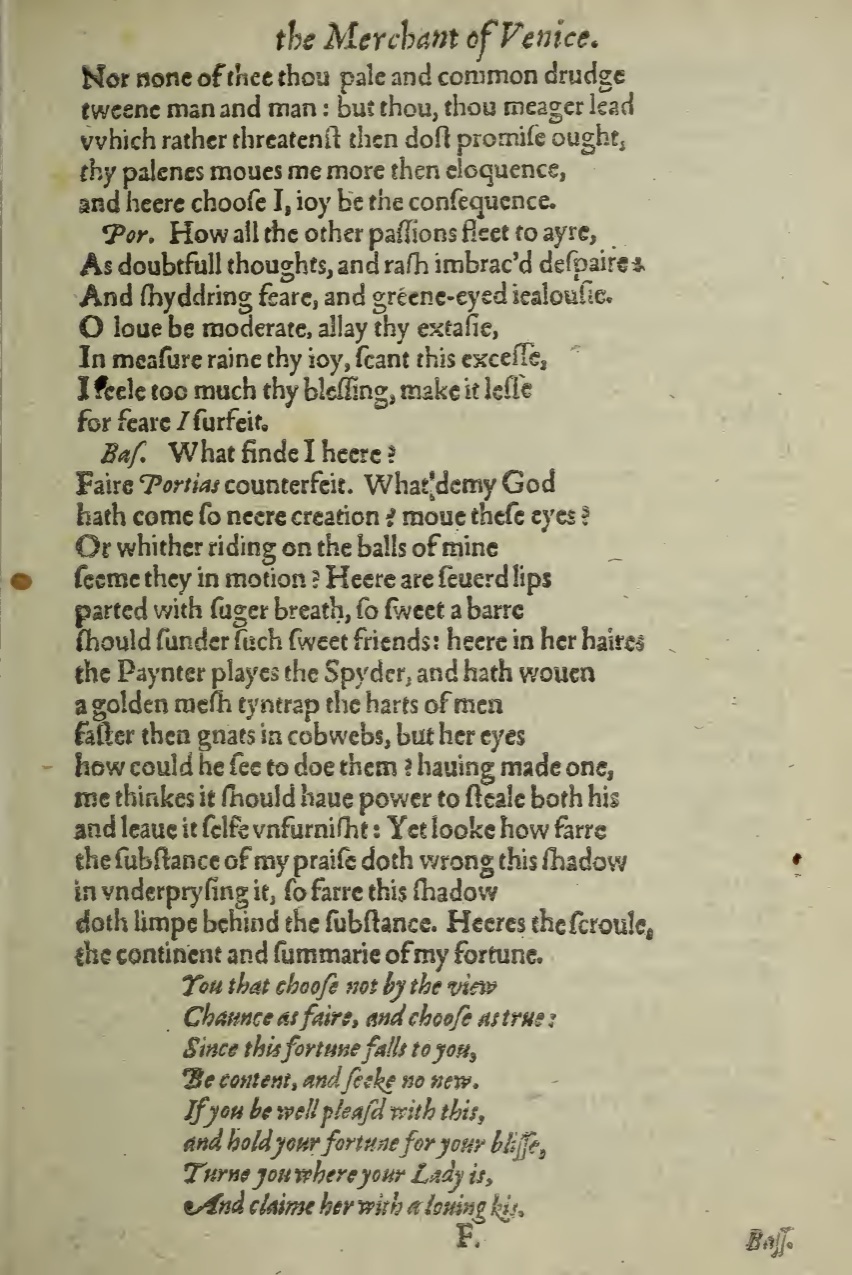Editorial note
Our page displays the changing of spelling from words in the Early Modern period into the 21st century. Most commonly, we edited the long s (ſ), removed an extra e (usually in the middle and at the end of words), changed u’s to v’s where appropriate, or changed the spelling of an archaic word. This shows the editorial difficulty in making certain calls when the choice isn’t as obvious as simply following this code. For instance, the word “underprysing” in the original text doesn’t have an immediately obvious contemporary word, so we chose to translate it as both “underprizing" and "underpricing” as it helps to illuminate the multivalent nature of the text and both choices fit for thematic continuity. We decided to include words such as “thy” and “hath” as we felt they would not inhibit a modern reader as such words remain in our modern understanding of the English language. The main goal was to increase ease of comprehension, in turn increasing the accessibility of the text to modern readers who may not have a comprehensive understanding of old style letterforms and spellings.
We used a color code—displayed below—to indicate the nature of these changes. In the case of words that required multiple modernizations, such as the word “severed” which required the changing of a long s, u to v, and spelling modernization, we coded the letter change in blue with the modernized word remaining in red (we recommend comparing the spelling to the image on the left if further comprehension of what changed is needed). Our work both shows the relative continuity in English spelling since the Early Modern period and the sometimes unpredictable nature of translation work when contemporary counterparts are not immediately clear.
Key
Letter changes ( u-v, i-j, ſ-s)
Modern Spelling changes (removal of e, ie-y, y-i, vv-w, etc.)
Refer to image on the left to further compare and comprehend changes made
Text
Nor none of thee thou pale and common drudge
between man and man: but thou, thou meager lead
which rather threatenst then dost promise ought,
thy paleness moves me more then eloquence,
and here choose I, joy be the consequence.
Por: How all the other passions fleet to ayre,
As doubtful thoughts and rash embraced despairs
And shuddering fear, and green-eyed jealousy.
O love be moderate, allay thy ecstasy,
in measure rain thy joy, scant this excess,
I feel too much thy blessing, make it less
for I fear I surfeit.
Bas: What find I here?
Fair Portias counterfeit. What demigod
hath come so near creation? Move these eyes?
Or whither riding on the balls of mine
seem they in motion? Here are severed lips
parted with sugar breath, so sweet a bar
should sunder such sweet friends: here in her hairs
the Painter plays the Spider, and hath woven
a golden mesh to entrap¹ the hearts of men
faster then gnats in cobwebs, but her eyes
how could he see to do them? Having made one,
me thinks it should have power to steal both his
and leave itself unfurnished²: Yet look how far
the substance of my praise doth wrong this shadow
in underprizing/underpricing³ it, so far this shadow
doth limp behind the substance. Heres the scroll,
the continent and summary of my fortune.
You that choose not by the view
Chance as fair, and choose as true:
Since this fortune falls to you,
Be content, and seek no new.
If you be well pleased with this,
and hold your fortune for your bliss,
Turn you where your Lady is,
And claim her with a loving kiss.
F. Bass.
Footnotes
- tyntrap-to entrap
- Noted as possibly coming from t'yntrap. Edited as 'to entrap' to enhance reader comprehension.
- vnfurnist-unfurnished
- Example of a word with many changes. Letter changes include v-u and ſ-s. The spelling was also modernized to denote past tense with an -ed suffix rather than the formed -t. The modern spelling also includes and the phoneme 'sh' rather than the singular 's.'
- vnderpryſing-underprizing/underpricing
- Intrigue found in this translations options. The long s present denotes perhaps a 'z' in modern American spelling culture. However, it is noted that a verbal experiment finds underpricing to be the most natural translation. We chose to include both options as they both offer insight into money culture at the time and themes of women as prizes or as having prices. Both translations seem to hold value in comprehending the passage as a whole.
Image credit: Rare Books & Manuscripts Department, Boston Public Library, copy G.176.16. The most excellent historie of the merchant of Venice. First Quarto. London: 1600.
Citing this page: Shakespeare, William. The Merchant of Venice, F1r. London: 1600. Cacodemon Digital Shakespeare. Edited by Maurin Stubbs and Harrison Staley. Source edition: Rare Books & Manuscripts Department, Boston Public Library (copy G.176.16). http://cacodemonshakespeare.com/comedies/merchant/f1r.
